Best Ethereum Mining Software (Ether Miner 2024)
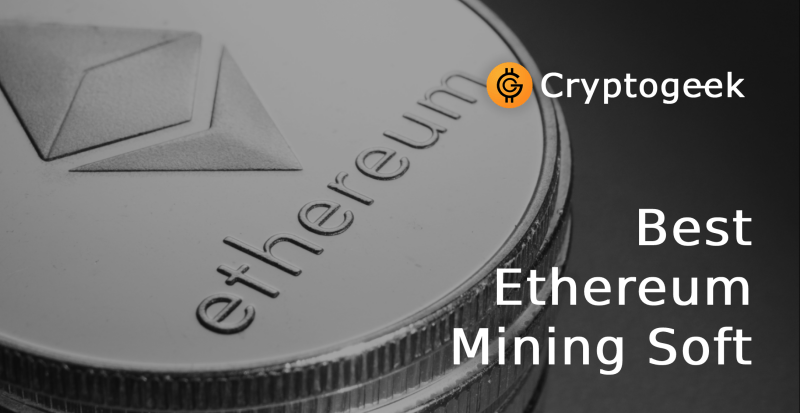

As of early 2024, Ethereum is transitioning from the Proof-of-Work (PoW) consensus mechanism to Proof-of-Stake (PoS). The latter doesn't require mining. However, as long as the transition phase is yet to be finished, Ethereum mining, if done correctly, continues to bring high returns. Considering that some experts name 2024 the Ethereum's year (due to ETH coin's steady growth), the Ether mining might be more lucrative than before.
Solo mining isn't profitable due to the high difficulty of ETH mining, however, mining in pools is still an option. The algorithm used in Ethereum, Ethash, makes ASIC miners only slightly better than GPUs. That’s why Ethereum is considered ASIC-resistant although Ethereum ASIC miners actually exist. The GPU-packed mining rigs are still effectively used in the ETH mining. The miners get profit from mining rewards, transactions fees, and gas fees. The article includes a short ETH mining guide and lists the mining apps and the platforms where you can mine ETH in 2024.
Contents
Before You Start Mining
The most reasonable way to mine ETH is through pool mining. Pool mining is a type of mining where the mining power (hashrate) produced by a group of miners is combined for better productivity. The block reward is split between the pool participants proportionally depending on your share of hashrate. Some money is collected by the pool as the mining fee.
To start mining you should do the following:
- Create an Ethereum wallet (you can use a plethora of wallets, supporting ETH, one of the most available cryptocurrencies in the world)
- Update the drivers for your GPU cards
- Choose and install the mining app that meets your requirements
- Connect to a mining pool and start mining and enjoying the rewards
There are some specifics to consider if you are going to start mining Ether. For instance, the ETH mining reward can be decreased or increased by the Ethereum core developers unexpectedly. The inflationary nature of Ether also adds some unpredictability to Ether mining as in contrast to Bitcoin, this cryptocurrency doesn't grow scarcer with the time.
Cloud Mining
Please beware of using cloud mining platforms. You can consider using a cloud mining service if the reputation of this platform is a clean slate. Cloud mining may seem attractive as it doesn't require anything on top of investing some money to enjoy the returns for a year or a longer period. That's much easier than building a mining rig and then doing your best to maintain it.
Unfortunately, too often, cloud mining platforms turn out to be unprofitable and not transparent. Users leave negative feedback, however, some platforms manage to continue operations. Some of the platforms turn out to be outright scams.
Go Ethereum
Go Ethereum or Geth is the client for working on the Ethereum source code, mining Ether, and performing other actions crucial for the Ethereum blockchain work and development. The client is a command-line tool.
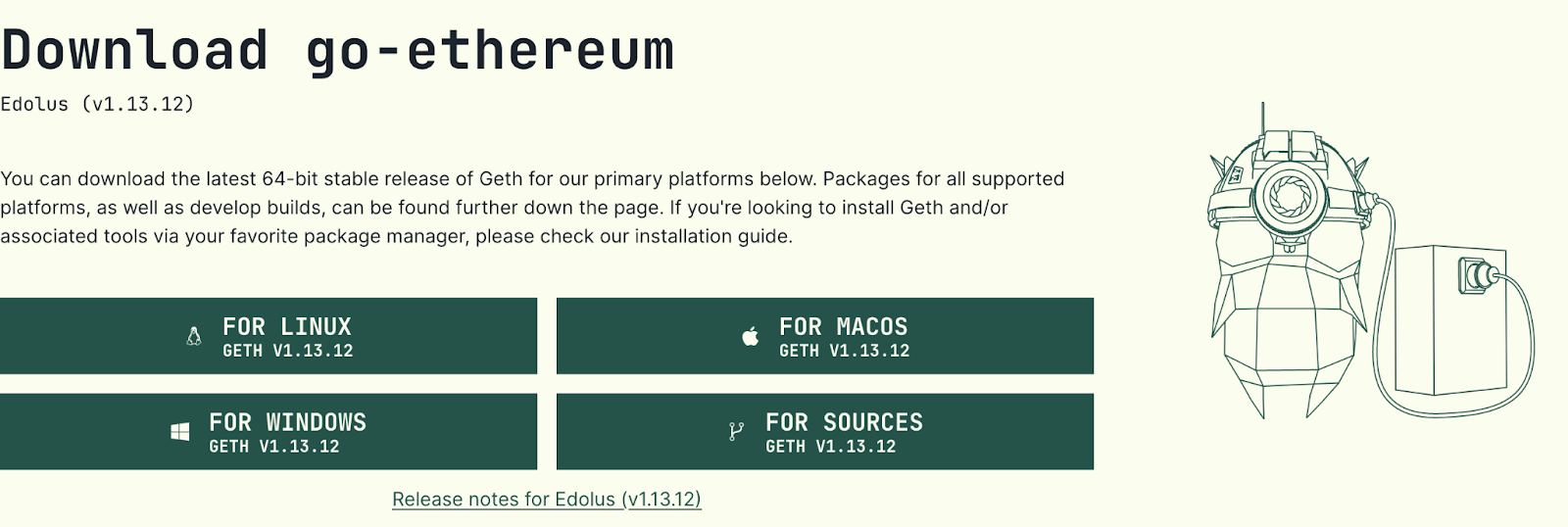
You can mine ETH using a Geth console based on JavaScript. After installing Geth, you should set a private blockchain directory and connect Geth with the Ethereum Mainnet. The mining rewards will be expressed in Wei, a small fraction of ETH. All the mined tokens accumulated on account 1 should be sent to account 2 to initiate an Ethereum transaction.
Commands miner.start() and miner.stop() are used to start and stop mining operations respectively. Check a more elaborate guide to mining ETH via Geth here.
Cudo Miner
Cudo Miner is a user-friendly platform used for mining various cryptocurrencies, including Ether. Cudo Miner is an automated mining platform that doesn't need much human involvement for setting and controlling the operation. However, you can still control and optimize the process via a console.
The miner is compatible with Windows, Linux or CudoOS. To start mining with Cudos you should download and install the app and configure it in a few minutes. Before you start mining you can do a benchmark on the Cudo Miner website.
If you are ready to spend some more time on configuring your mining process, you can use advanced features, such as overclocking your GPUs to maximize mining profitability. According to the Cudo Miner website, overclocking can increase profitability by 30%.
If you mine via the computer you use for other purposes, Cudo Miner can automatically pause when you perform usual actions on your device so that mining won't interfere with your activity. The mining will start automatically when the system is idle.

Advanced users may opt to use a command line client. The latter is lighter, consumes less resources than the regular app, mines faster, can be enhanced via scripts, and more stable.
Kryptex
Kryptex is a Windows-based mining app supporting several cryptocurrencies (Ether included) in the pool. Once set the process is more or less automated. Kryptex allows you to withdraw the currency you mine or convert it to fiat money (USD, EUR, RUB, UAH, or KZT) and send it to your bank card. The minimum withdrawal amount is set at mere 50 cents.
Like many other mining platforms, Kryptex has a benchmark feature and mining calculator so you can estimate the future profit based on your hashing power analysis.
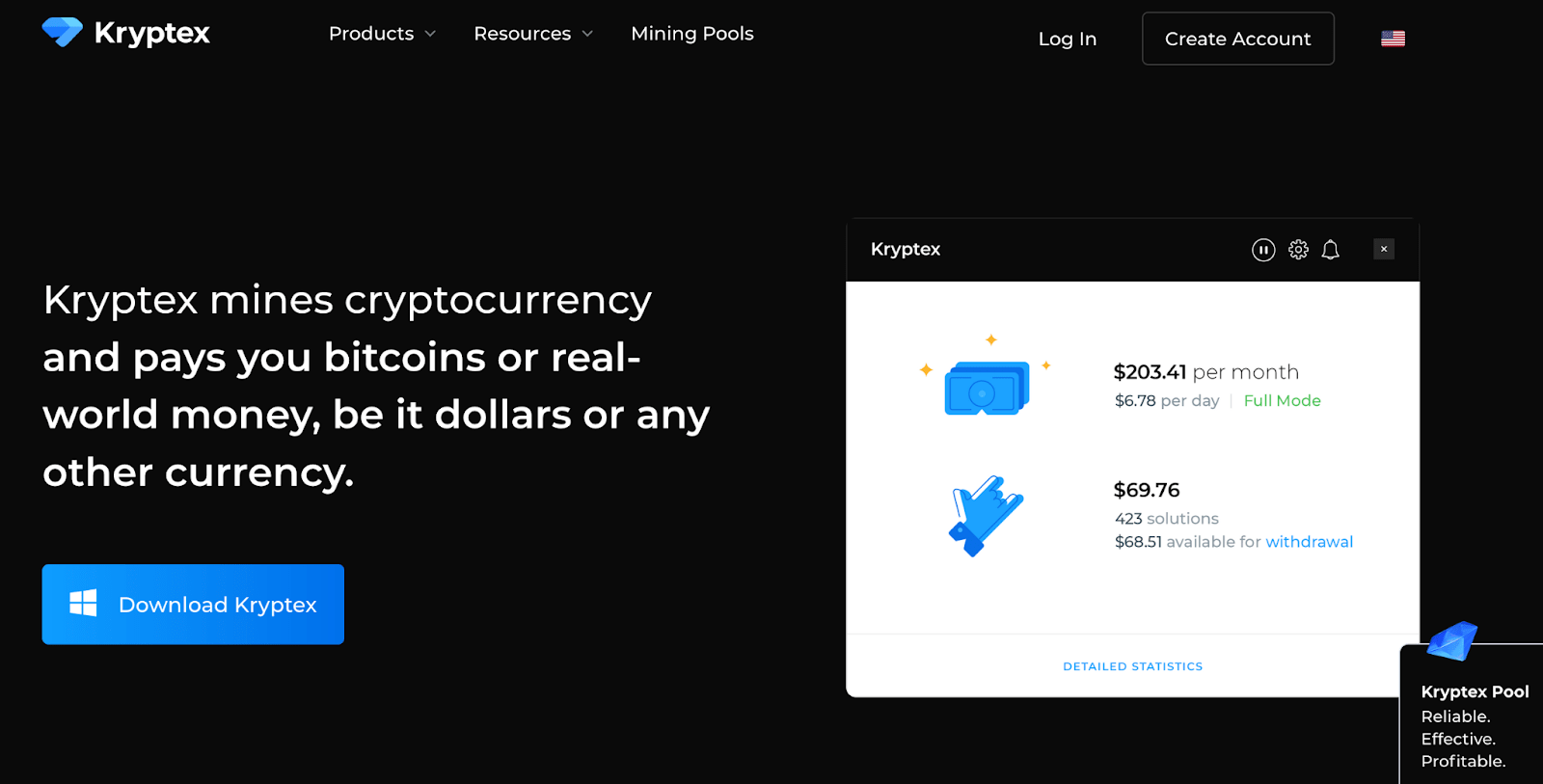
For the ETH mining, the minimum hardware requirements of Kryptex are Nvidia GTX 1060 or AMD RX480 GPUs or better. The really profitable mining won't start until you use 2060 Super, 3060 Ti or something of a similar level. You can't withdraw until you earn $1.
PhoenixMiner
PhoenixMiner poses itself as the fastest Ether miner with the lowest fees. According to the PhoenixMiner website, thanks to the unique application design this miner has a 3 to 5% higher mining speed than most miners. This is achieved through a higher amount of valid shares, better GPU load, and improved code parameters. The inbuilt controller detects the malfunctions and stops of individual GPUs in the rig and restarts them automatically.
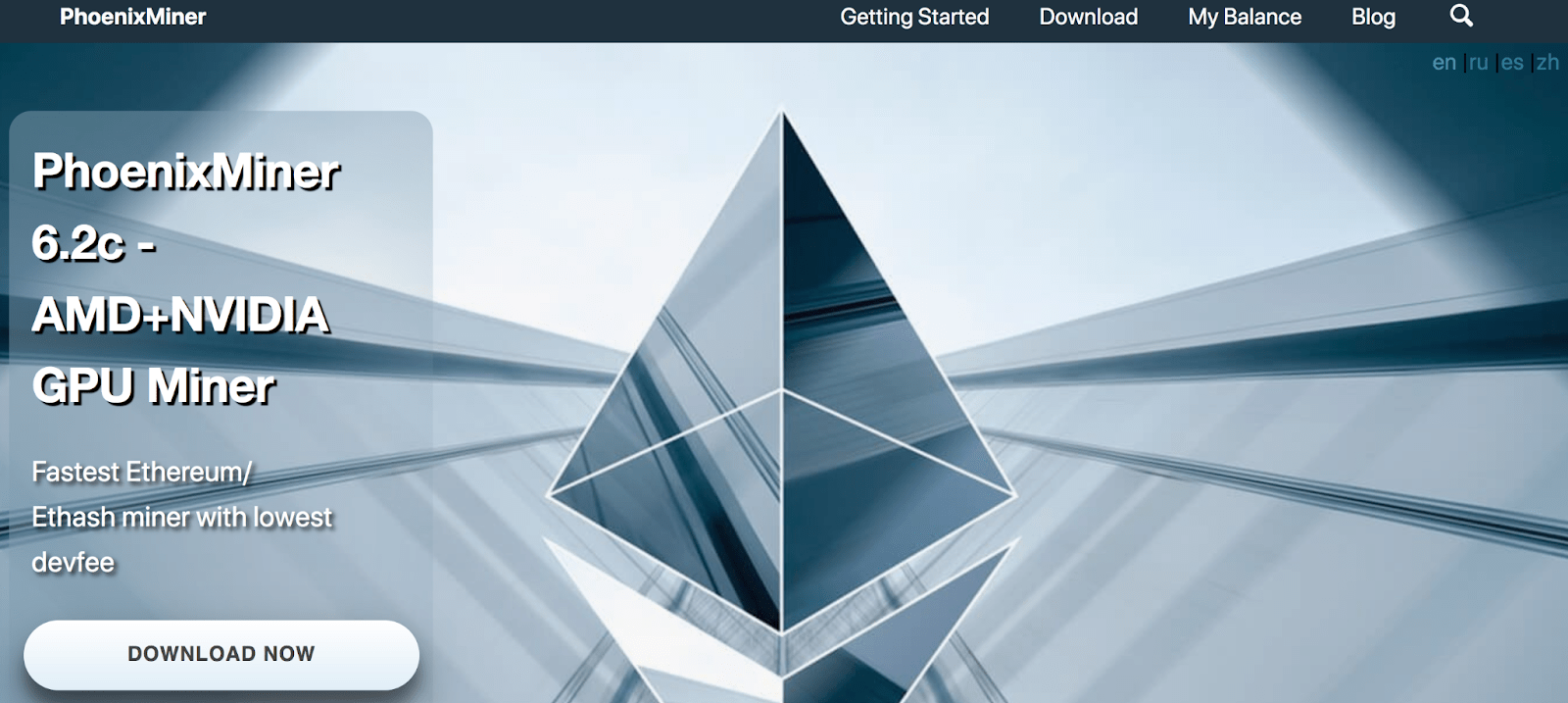
PhoenixMiner is compatible with both Nvidia and AMD cards. The mixed rigs are supported too. As for operation systems, PhoenixMiner runs on Windows and Linux. Through the command-line operator you can activate memory straps for your graphic cards.
As you download and unpack a PhoenixMiner zip file, you will need to add or edit the batch file. You can find the elaborate instructions on it right on the homepage of the miner website. Just scroll down.
Name your rig and add a wallet address before you start mining. As you are done with it, choose a mining pool, connect to it and launch an operation by double click on the .bat file.
NBMiner
NBMiner is similar to PhoenixMiner. It supports mining of around a dozen cryptocurrencies, including Ether. NBMiner software is a dual miner, meaning it works with AMD and Nvidia GPUs and is compatible with the rigs using both brands of graphic cards. The miner can be used on Windows and Linux.
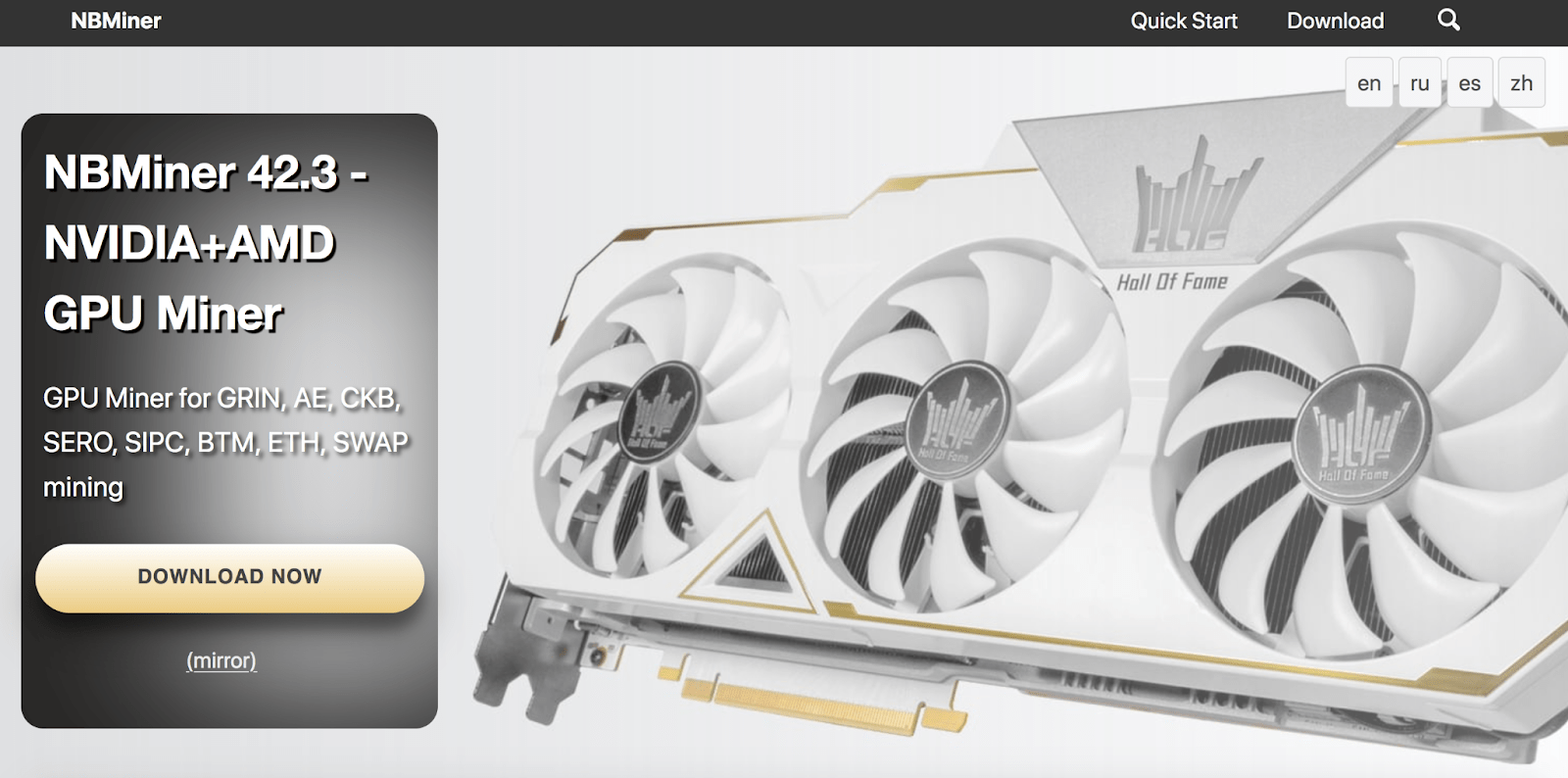
The ETH mining fee amounts to 1%, rather a low or average fee. Another benefit of NBMiner is the stable power consumption which helps to avoid unproductive mining.
According to the NBMiner website, the solution fits best the medium or large mining enterprises as the miner is capable of keeping huge farms work stable. To provide users with privacy, NBMiner provides an SSL-encrypted connection to mining pools. All the mining data is stored locally on the user's device. For higher security, NBMiner can be connected to hardware wallets like Ledger or Trezor.
Conclusion
As long as Ether is yet to fully transition to PoS, ETH mining remains a lucrative enterprise. For beginners, mining can seem demanding. However, the mining community has accumulated a strong experience, so you can hit the web for assistance and useful guides on how to use particular mining software or choose the best mining pool.







Here are no comments yet. Be the first!